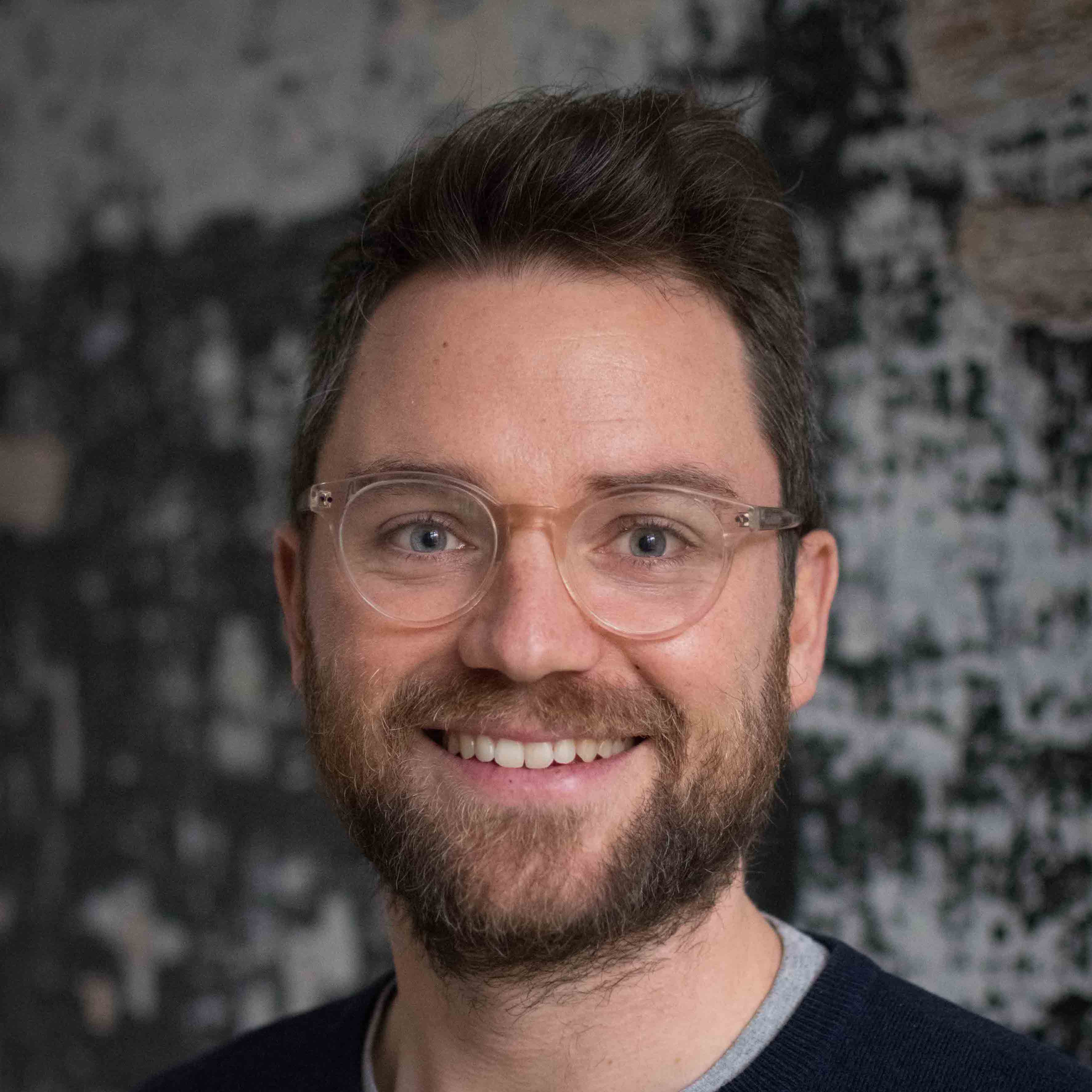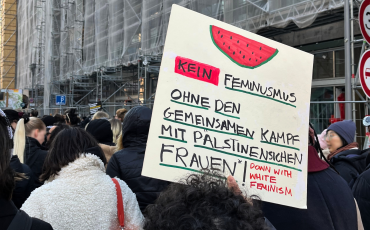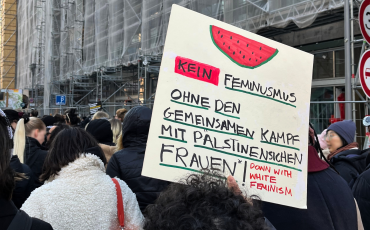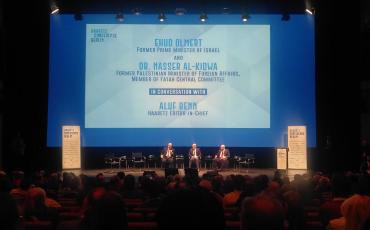“Connecting resistances” seeks to overcome the geographical and emotional distance that nationalist border-practices manifest. Through political involvement, compassion is cultivated, and a shared sense of belonging developed. But this is heavily contested, as voices* from in between many places testify.
Yabrek, you are originally from the Philippines. But you have been living and working in Lebanon for almost 20 years already, where you are fighting for the rights of migrant domestic workers. Does this change your feeling of home?
As a founding member of the Alliance of Migrant Domestic Worker in Lebanon (FB-Link), I’m increasingly comfortable with living there. For half my life, Lebanon is like my home already. But migrant domestic worker (MDW) don’t have protection. We are the core of the struggle, but are not registered here, it is easy for the general security to deport us. This is why we need NGOs to be our allies.
Faced with such vulnerabilities, does your political work, and the connection with other MDWs help to provide a support-network?
I don’t have a lot of connection to other domestic worker from the Philippines. Mostly I have connections with other foreigners, like people from Nepal, Sri Lanka or the ones I met at conferences and workshops. This helps a lot, and I am very grateful for it.
David, you are one of Yabrek’s colleagues. Coming from Ethiopia, how is living in Lebanon for you?
I never felt at home in Lebanon. It’s simple: As a MDW, we are not at home. So we are fighting for the rights of MDWs, fighting for a home, to be treated like humans. There is too much crime against MDWs, but no help. Every day, people are suffering and dying just because they are MDWs. There is no justice. We are not even treated equal in front of the law. How can I feel at home in this situation? How can I feel home when fellow MDWs are treated like garbage by Lebanese and some foreigners, even though they came to support them?
Tamer, your political engagement also spans wide distances. As an Egyptian living in Germany, how does this influence your personal and political involvement with what is currently happening in Egypt?
I've long thought that living abroad makes one's views and opinions on Egypt very distanced and less credible. Egyptians and non-Egyptians living outside Egypt always seemed to miss much of the details of what's happening, focusing on some superficial point or another, influenced by the Western liberal, usually oriental, lens.
This became especially clear to me during the revolution. During that time, it was impossible to understand what was happening without being there. This implies attending protests, observing expressions and interactions, feeling the change in the political situation, reading the radicalization of large segments of the population, their learning and the corresponding choices they make, and the history of all that.
Now that this revolutionary situation has come to an end, it's probably not as important to be in Egypt anymore. But it is still primary to the development of sound and credible perspectives on Egypt, which in turn are necessary for an engaging and effective activism. This is why I try to visit Egypt at least once every six months for a while.
What challenges, dilemmas maybe, do you face with this?
I realize this is not enough, and I feel that people in my situation should be humble knowing that by staying abroad, they are gradually losing authority and credibility on Egypt. In the meantime, living abroad, especially in the current situation in the Middle East, one enjoys some advantages. While a specific and deeper experience is degrading, a wider – albeit more superficial – regional and international knowledge is attainable. One is able to meet and interact with people with similar experiences from the region and beyond. There are more resources and infrastructural access one enjoys here, which can be used to support fellow activists in Egypt. Additionally, lobbying of foreign governments is more doable. But I find it generally ineffective, for governments respond to power, not morally-based pressure.
Nadine, you are half-Egyptian, half-German, currently living in Germany. Does this affect your sense of home?
Home, when you feel that it is being taken from you, becomes a complex notion, attached with many emotions. Though I am half German, half Egyptian, I was raised and lived most of my life in Egypt. As exhausting as daily life there is, it has become the place I can identify with the most, where I feel comfortable because I understand the social dynamics and know how to react in different situations.
Germany, though it is highly organized and bureaucratic, gives a different feeling of living. Despite the fact that I speak German fluently, different survival strategies and feelings of belonging have become part of the daily struggles. But it is not only a question of language, though it is also important to have the possibility of communicating with others; it is a different way of living, navigating through the society and so on.
Does this notion of home, as complicated as it is, influence your engagement with what is happening in Germany?
Living in Germany, I am curious to understand how the political system works, what the social problems are, how people here organize themselves and get engaged. But this is hard sometimes because, with the migrant ‘crisis’, most of the political debates have been fixated on ‘the other’. So, I wonder what is happening in Germany other than that.
I try to participate in demonstrations and join groups that share my concerns: a greater and more meaningful solidarity among ordinary people, to overcome the dominance of state powers over the ‘simple human’, and to be able to lead a signified life despite of nationality. Other than for issues that connect Germany to Egypt in direct or indirect ways, such as migration, I have not participated in Germany. But I would sign a petition and join a demonstration in relation to housing issues, one of Berlin’s greatest challenges.
Jesse, how might this be “the other way ‘round”? You have worked on “diaspora mobilization” a lot. What does it mean for you, now that you will move from Munich to Sudan to start a position in development cooperation there?
To be honest, I have never reflected about “diaspora mobilization” in relation to myself. What I am currently more concerned with is trying to reconcile that I will be moving abroad to work in an industry that I am very critical of. Not only does this limit my options to be engaged at home, in Munich and Germany. Being abroad, I also cannot directly give back from my privileges as a German citizen.
Are there topics that are particularly dear to you, topics that might even reach from Germany to Sudan and back?
A coworker once asked me about a Sudanese colleague wearing a hijab: “You think she will become more open-minded and criticize her religion now that she spends more time with us?” I could only respond that our colleague, a black woman, with a hijab, who had lived in the US before, is probably much more aware of her identity than either one of us.
How then can I become part of a politically mobilized diaspora in Sudan while most Germans there are stuck in a lofty expat-bubble? They think that their NGO-work was political engagement enough. But most of them don’t speak the language and know very little about the society – apart from the measures and indicators that are relevant for their projects. But my hope is that white people who are living there as a minority will eventually also come to reflect about their identity. This could really build bridges to Europe.
Intisar, while Jesse is moving to Sudan soon, you are living and working there. What is the relation between “home” and “political activism” for you?
Living in Sudan, and being politically active here, enjoys advantages, but also suffers from setbacks. On the one hand, it makes it easier to keep up with problems and gain the citizens’ confidence because we are closer to them. Activists also have access to organizational support. You can really be an action maker in the heart of the resistance and solidarity. On the other hand, what is really bleak is that activists at time suffer from being governed or tied up by social, cultural and economic customs, traditions or conventions.
Do you see a difference in the political involvement of foreigners?
For foreigners, the situation is entirely different from those involved in their own countries. They have access to freedom of speech but many lack public support. After all, a remarkable number of locals think foreigners are interested only in their own profit and living in luxury. The biggest downside of being active as a foreigner here is losing the friction with the public, which may result in a wide gap between the activist and local community. The former depend on the latter to continue what they are doing, but their problems might be really different. So when foreigners raise an issue, this has limitations.
Ebru, you have moved from Turkey to Central Europe. Being abroad, has your sense of home also changed?
I grew up in a home with family members who had been politically active in the past and experienced losses and suffering in the country I come from. This ambivalent relationship leads me to challenge the given definitions of home, to redefine and expand its boundaries beyond the confines of the family, country, nation. In the same time, I seek a sense of belonging, of roots and familiarity. Now that I am away from ‘home’, I ask myself how to talk about it, engage with it personally and politically. Can you have the same terms of engagement from a distance, what is the ethics of such engagement in relation to those who are back home?
How does this affect your involvement with what is happening in Central and Eastern Europe, where you live?
If there is one thing my parents taught me well, despite their own struggles, is an expansive understanding of what 'home' constitutes. So I take that with me, 'from home' in a sense, and this is the basis on which I try to engage politically where I am today. Despite important differences between here and Turkey, I find there is a shared experience of injustices, inequalities, struggles. The current political transformations in Central and Eastern Europe as well as Turkey cause despair and frustration, but also hope for the potential for common collective struggles. So engaging with the here-and-now, with this broader understanding, feels as a duty and also part of a necessary political engagement in connection with home to me.
Firas, you are living in Beirut, but believe in internationalism. What is your sense of home, and how does your political activism contribute to it?
I think about home as the place where I feel a sense of affiliation to the space and collective. Where I do not question whether I belong. Where I have experienced and been shaped by the cultural and social norms and structures. And finally, where I have zero doubt that I want and can contribute. Being politically engaged at home feels more self-evident than any other engagement or commitment. In fact, one, if not the main reason that I decided to live in Lebanon instead of abroad, is that I feel that my contribution can be much more significant here.
Although I completely believe that internationalism is more needed than ever, and that people bring along very helpful backgrounds and experiences when they migrate, some degree of alienation is inevitable when we move to another place. When I lived abroad, I was constantly aware of the possibility of leaving everything and going back home or moving to another city as soon as circumstances require. This made my political engagement in temporary homes a less necessary and sometimes less rational choice, countered by the uncertainty of the future and the feeling that I have no responsibility to act.
When activism is a personal choice rather than a collective need or requirement, it becomes a lifestyle decision like any other; and this makes one an unreliable political actor. I want to be where political involvement is not about my lifestyle or personal identity, but rather about inevitable collective salvation.
Thank you all for this conversation!
* all names have been changed.





















